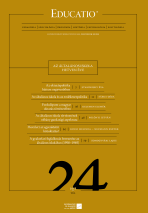A tanárrá válás indikátorai az 1945 előtti Magyarországon
Indicators for Becoming a Teacher in Hungary Before 1945
Author(s): Zsuzsanna Hanna BiróSubject(s): Education, Recent History (1900 till today), History of Education, 19th Century, Pre-WW I & WW I (1900 -1919), Interwar Period (1920 - 1939), WW II and following years (1940 - 1949)
Published by: Akadémiai Kiadó
Keywords: history of professions; features of the school market; study strategies; teacher’s career;
Summary/Abstract: The analysis of Zsuzsanna Hanna Biró is based on an integrated personnel database that contains registration data for secondary school teachers graduating between 1873 and 1945, and the teachers’ data from the so-called secondary school pocketbooks. There is the attempt to correlate possibilities for becoming a teacher with three sets of variables: a) the structural features of the school (gender and confessional segmentation), b) the role played by cultural capital and the transmitting of professions among factors connected with family socialization, and c) the impact of the choice of higher education studies and gaining a doctoral. A logistic regression analysis proves that becoming a teacher relates to all three sets of variables. Among structural factors, gender separation seems to be the stronger indicator, which, due to the straitened market in which girls’ schools operate, shows a lower chance of female graduates becoming teachers throughout the covered time period. ”Confessional inequality” can only be mentioned in relation to Jewish graduates, and their situation improved only temporarily, in the 1920s, with the opening of Jewish schools. The father’s education was not a substantive indicator. Male teachers usually emanated from families with a low socio-economic status – while a higher proportion of female teachers came from families possessing a high socio-economic status. Transmission of professions played a greater role in any teaching career after the First World War. However, one’s study program has always been able to improve the possibility of one’s getting employment in this time period – which can be especially seen in the case of language faculties. Though having a doctoral degree had no direct influence on someone’s taking up a career, a lack of academic positions did result in the fact that more and more teachers with academic ambitions got a job in secondary schools, which significantly raised the prestige of being a teacher in the first half of the 20th century.
Journal: Educatio
- Issue Year: 24/2015
- Issue No: 1
- Page Range: 13-29
- Page Count: 17
- Language: Hungarian

